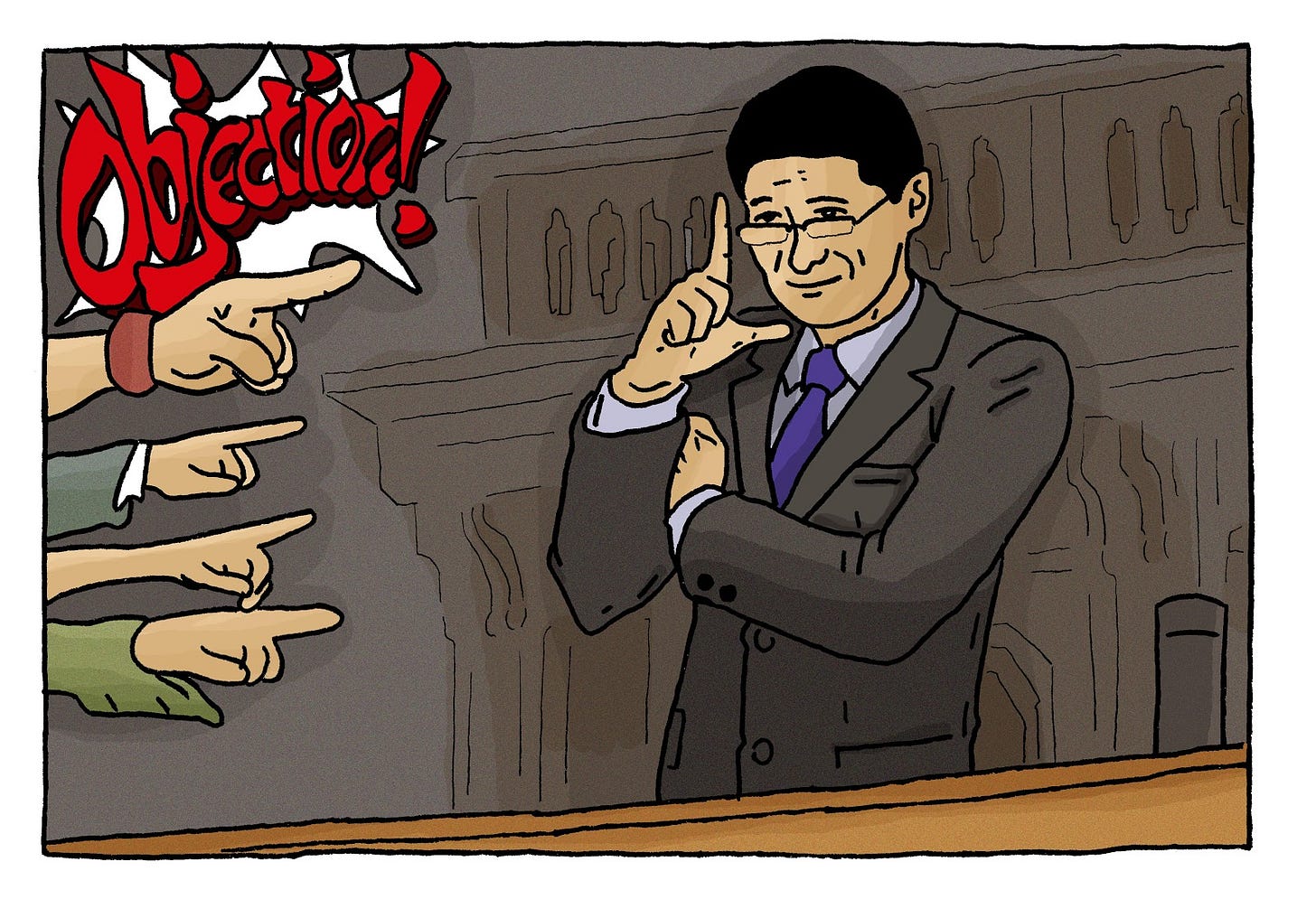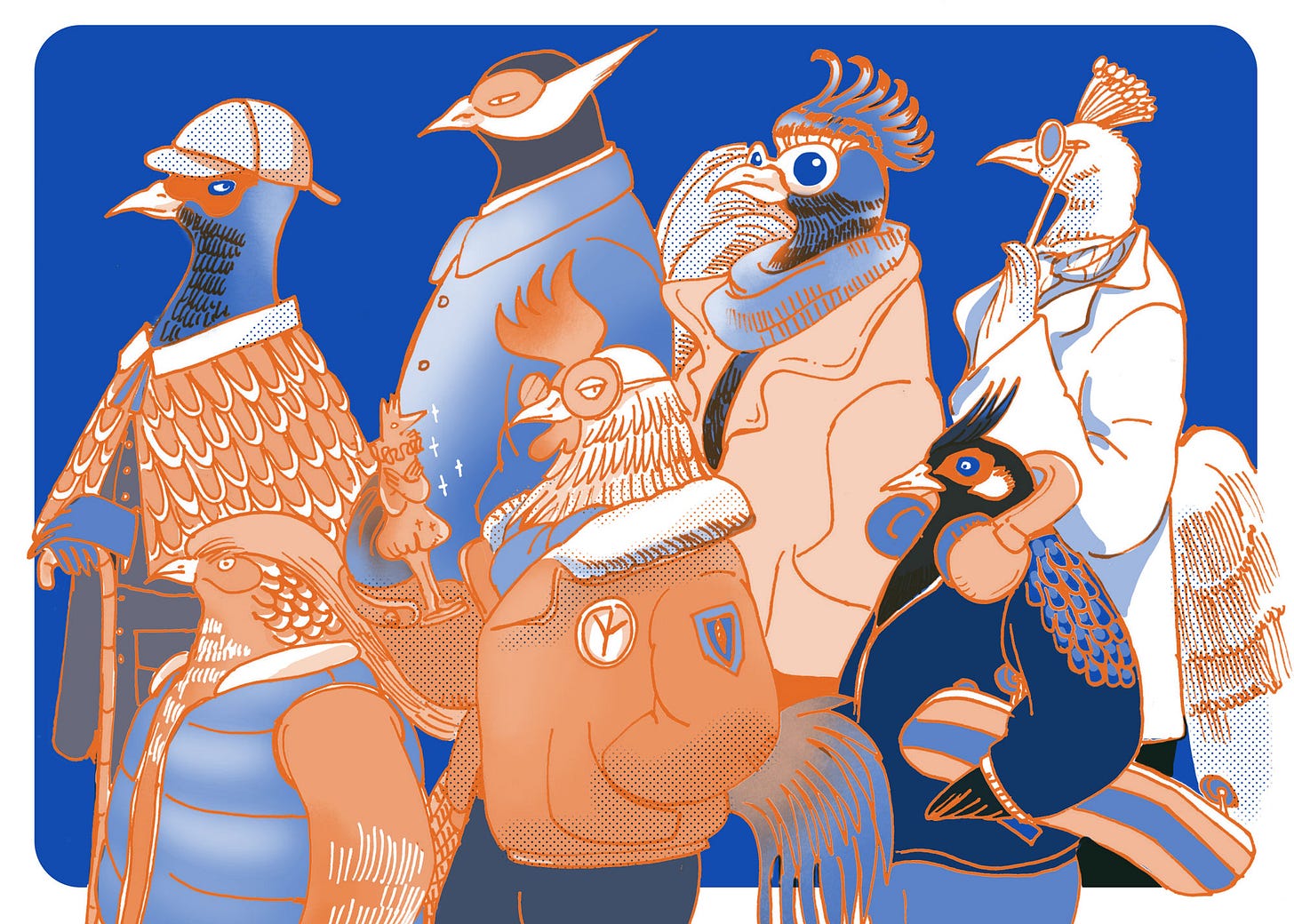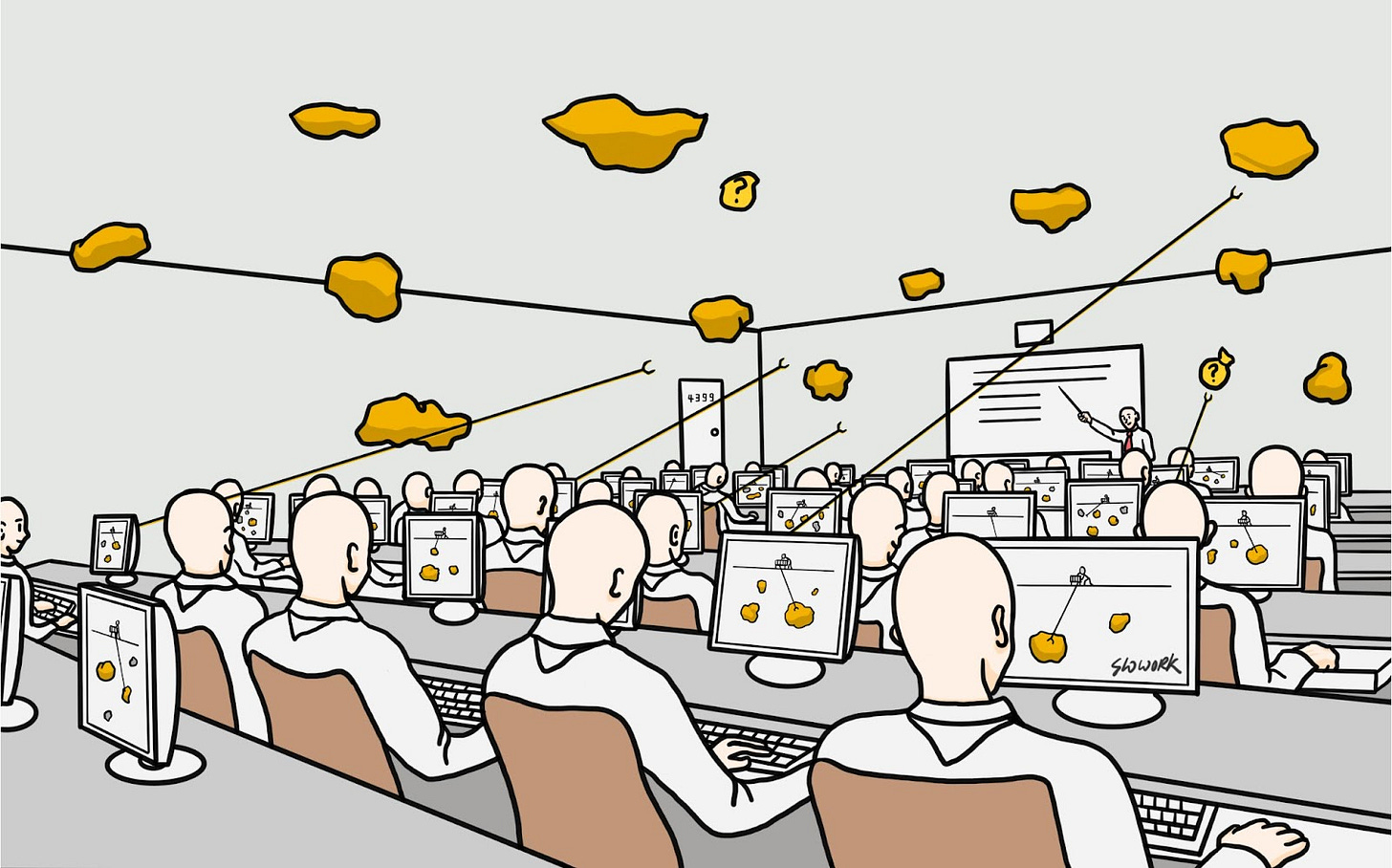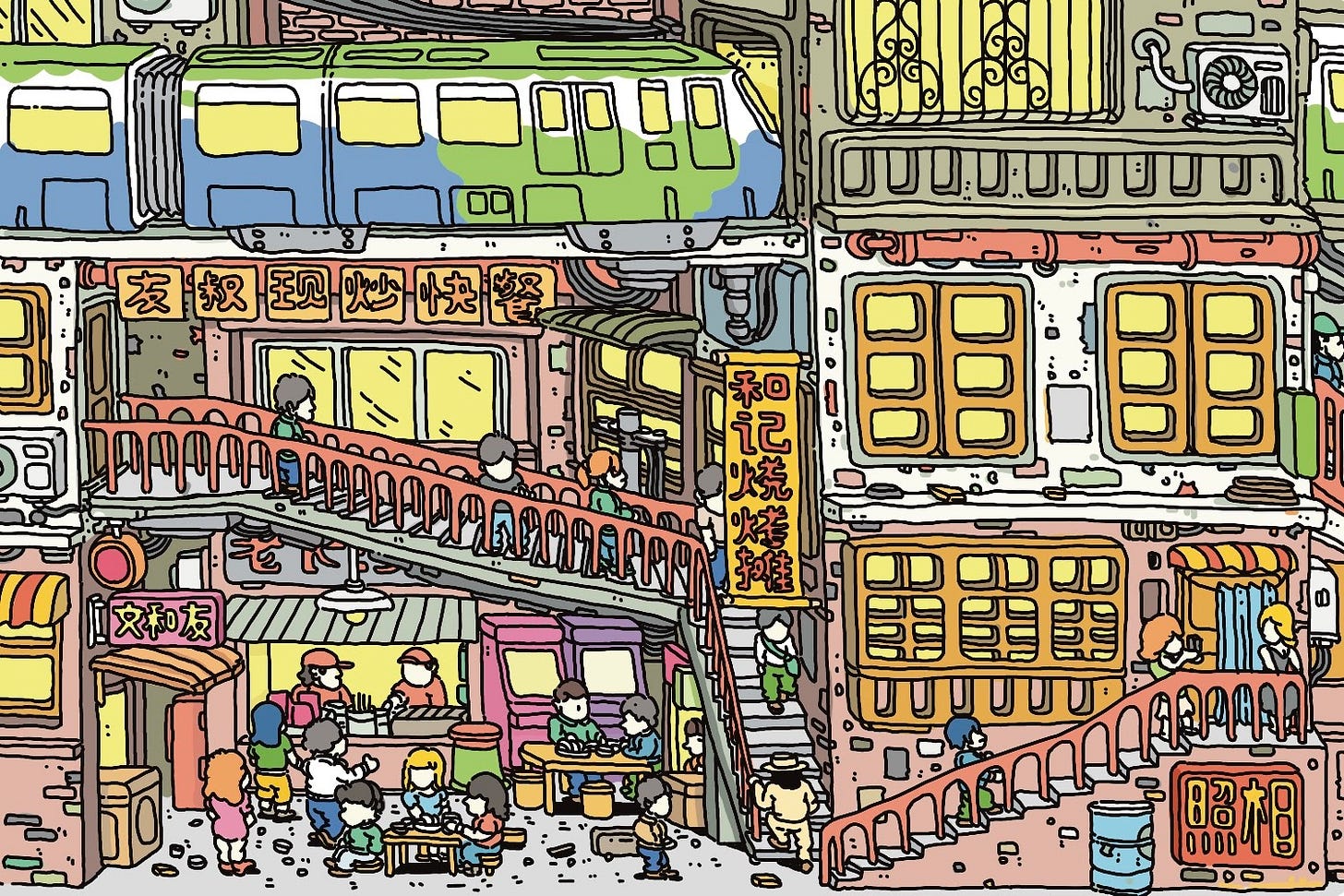“Do you trust a can of fish without an expiration date?”
—Jaime, Chairperson, Chaoyang Trap
Krish: An ending, like time, is a scam.
We started Chaoyang Trap with an expiration date in mind (“two seasons”). We’ve been putting off calling any episode our “finale”, reluctant to run up against this self-imposed doom. Our wild run, once exhilarating, now feels exhausting. Season 1 had 10 published editions. Season 2 has 21.
It’s devastating to call time on a project we love, but some kind of ending is inevitable. Is this permanent? Who knows.
In some ways, we’re not needed anymore. The Chinese web has morphed beyond what our specific format is able to capture, and many of our members have adapted—writing, editing, explaining, curating elsewhere. We gave serious critical consideration to subcultures that the broader China media landscape either ignored or covered in shallow ways, and much of what we wrote has now (re)appeared in major publications. We always wanted to be a complement to existing China coverage, and in that we succeeded.

We also failed. Chaoyang Trap was an exercise in discernment, in close attention. An invocation, paraphrasing Katherine Yang, for a softer Internet against “unfeeling logic, thoughtless utility, and stratified competition.” Very little of the broader discourse around China fits that description, somehow more cursed than when we began.
The chances of us coming back are…unknown, but Chaoyang Trap even existing was a miracle. Thank you for reading, and for being part of it. The site’s archives will remain online here and at chaoyangtrap.house, and we’ll keep our Twitter active to promote the work of friends and lovers.
For now, as Jack Halberstam reminds us, we “quietly lose,” and “in losing imagine other goals for life, for love, for art, and for being.”

Tianyu: After several attempts at drafting a Chaoyang Resuscitation Plan, my mind kept going back to Chris Xu’s 2015 essay, “Your Product Deserves a Good Death.” All good things come to an end; our group is scattered throughout different time zones, and our old editorial process (meeting late night for natural wine in Beijing) was no longer sustainable. Maybe the real plan we needed was a do-not-resuscitate:
The end of something, when unrushed and deliberate, is a time for celebration as well as closure. It’s an opportunity to reflect back on everything that’s happened, good and bad, and how it’s affected you. The end is a chance to tell the project’s whole story, a chance for the community you built to celebrate how they came together in the first place, and for everyone to exchange contact information and pack up their things. It’s a time to say goodbye and thank you, and then look ahead.
Chaoyang Trap’s success was somewhat unexpected; so will be, I hope, its legacy.
Both pro- and anti-government writings on contemporary China fall into the trap of Chinese exceptionalism—that China is either exceptionally good, or exceptionally bad. What we believe is that the everyday realities in China—online and offline—are manifestations of global systems and trends. They should be neither observed in an ahistorical vacuum, nor divorced from the political economy and ideologies that are inherently transnational. Instead of writing about contemporary China as a static object to be watched from afar, we wanted our readers to examine the shared structures of oppression, alienation, and techno-solutionism in the Global South and North—along with them, the chasm on the marginal and the possibilities for subversiveness. The wanghong doesn’t have to be Chinese; neijuan is everywhere; to quit quietly is to lie flat. What happens in Chaoyang doesn’t stay in Chaoyang; if you look closely enough, there’s always a Chaoyang Trap near you.
Yan: As per usual, all my complicated feelings captured in one WeChat sticker:
Still hoping one day, somewhere, we will organize Chaoyang Con!
Krish: In the meantime, we do plan on making Chaoyang Trap zines and haunting some art book fairs!
Simon: Mentally I’m here (Chaoyang), but are any of us still physically in Chaoyang?

████: I may not be physically in Chaoyang any more, but I will definitely remain in Chaoyang forever metaphysically (along with plenty of my blood, sweat and tears.) And so can you: if you liked the mission of Chaoyang Trap and wanted to do something like it, or were thinking about submitting something (anything!) then you should still do it! The world deserves it.
Emily: (^I am! But leaving very soon…) It’s fucking lonely to write about a neglected subculture and believe in the significance of it all. Discovering and becoming a part of CTH was like befriending someone I didn’t know I needed, or hearing a voice chime in on my feeble murmurs. I’m forever thankful for that. Here’s to more adventures ahead!
Caiwei: We will always have Chaoyang!! Writing for Chaoyang Trap feels like entering a room of concerned friends, where any esoteric interests are always greeted with passionate comments. It’s a time of life as much as a state of mind, a source of endless inspiration and joy.

Ting: I will always associate Chaoyang & Chaoyang Trap with a period of my life where I found a voice, a (even if small) sense of meaning, and a group of people that I dearly, dearly cherish.
CX: Nope, I’m not letting y’all close this out with any amount of maudlin emo sentiment no matter who you paraphrase. Not this time, Krish!! For its whole existence, Chaoyang Trap was everything you all set out to create and more—an outlet that wasn't afraid to get weird or specific or unsparingly shady, a project that respected and paid its creators, the rare club that balanced having open arms for kindred spirits with good discernment. A mfing treasure trove of mindblowing content for its intended audience.
Any project that manages to make something good and true (in this economy????) is already a miracle. Any project that does so while being a good time and knitting together thoughtful people in a way that will outlast it? At the very least, the start of many beautiful and yet unpredictable things to come. If you helped make this thing happen and don't feel immensely proud of yourselves, I'm coming to wherever you moved to after Chaoyang and kicking your ass personally 😤

Simon: I’ve been a bit curious about different temporalities of the pandemic recently. Which is to say, in 2022, if you were lucky enough to not be in Shanghai or somewhere else that went through an extreme lockdown, your experience was perhaps more similar to 2020 in the rest of the world than the preceding years—the uncertainty, the closure of “non-essential” spaces, and finally, everyone getting Covid. I hesitate to say that China felt more optimistic two years ago when Krish sat me down to show me his Powerpoint pitch for Chaoyang Trap, but it seemed like the world had not curdled into its current shape. It should be interesting to see how these two timelines synchronize—or don’t—in the coming years. On one hand, increasing antagonism between China and the West means the two sides feel culturally farther apart than ever, though in terms of online life there might actually be a kind of convergence. The spread of TikTok and people engaging with livestreams and gaming more while being stuck at home has maybe led Americans to be more immersed in Chinese ways of being online, if not necessarily Chinese content. It should be interesting to see how this develops going forward, but at the same time, I’m sick of the line “this is the most interesting time to be in China.” To borrow Geremie R. Barmé’s coinage, it can really feel like an “empire of tedium.” In some ways, life is getting better, and every month it seems like there’s a new museum, independent bookstore, or record label. Yet most of the time these are showcasing work from the same limited cast of people, who can’t or, more sympathetically, are blocked from expressing anything with real bite. Here’s hoping this year brings more organic cultural exchange and things get better!
Yi-Ling: I’m sad. I’ll miss being in the same space, with fellow CTHers, talking about CTH, over a bottles of tsingtao and giant lamb leg roasted on a spit. There’s nothing like debriefing the group chat in person. At the same time, this feels nothing like goodbye. I feel like I still carry the Chaoyang Trap ethos in everything I do today: its commitment to experimental collaboration, its love of the niche and marginal, it’s refusal to be reduced into simple narratives. I’ll be looking for that spirit wherever I go: be it Chaoyang, Haidian, Shanghai, Hong Kong, Taipei, Amsterdam. Chaoyang seeds blooming all over.

Steven: I’ve been a fan of Chaoyang Trap for much longer than I have been an actual member, and I guess my thoughts reflect that. First reading Chaoyang Trap was like bringing an everyday object under a microscope: the subcultures examined were vaguely familiar, but upon zooming in, they appeared so much more fascinating and complex than their flattened forms that had diffused to the Chinese mainstream. Chaoyang Trap’s work inspired me to write a piece myself, and while I was never able to meet everyone else at CTH in person, working with the team online was a wonderful experience. (Communicating digitally was also befitting of a publication about, well, digital subcultures.) Although CTH is drawing to a close, I hope our readers will also feel motivated to explore the online subcultures that they find interesting. All online ecosystems are constantly in flux, with new communities constantly forming and fading away. This is doubly true in the Chinese Internet, where grassroots vitality chafes against state censorship, and subcultures continuously morph—or disintegrate—in response to regulation. Subcultures are dynamic, and there is always something new to write about.
Aaron: As someone who was always a Dongcheng guy, I can testify that Chaoyang really is a state of mind. It’s sad to see Chaoyang Trap go, but ultimately I just have to trust everyone who contributed or read it to carry on the ethos and keep digging deep into systems and subcultures the world over.
Henry: I loved these little comment section exchanges where a passing observation or wry joke got nods and laughs from three people—as far as I was concerned, that was more than enough.
Krish: Outro music is Goodbye, by Chinese Football. Goodbye.
Tianyu has left the group chat. He was Chaoyang Trap’s first and last intern.
Yan is FAR away from Chaoyang, but it is always NEAR to her heart. This is not subliminal advertising.
Simon lives and works between Changning, Jing’an, and Pudong, lol. Despite the negativity of his comment, he really appreciates all the hard work everyone put into Chaoyang Trap and misses them all!
Caiwei is in the Upper East Side’s Chaoyang enclave, where she recreates Beijing street food with ingredients bought from Morton Williams.
Ting is in California missing beer at Jing-A, burgers at Slow Boat, brunch at friends and that one afternoon we watched Leto.
Yi-Ling loves sowing and cultivating seeds. Especially Chaoyang seeds.
Krish is in Amsterdam, where he misses all the Chaoyang exiles.
C(hris) X(u) has enjoyed being Chaoyang Trap’s aggressively supportive tiger parent and #1 fan (in terms of both chronology and enthusiasm).
Emily will be sulking about Chaoyang Trap’s closure in London’s endless rain.
████ is in Shanghai, but will never be able to stop talking compulsively about Chaoyang.
Steven is looking for baodu in the Bay Area, but will be back home in Chaoyang over summer. If you know of any nearby Beijing restaurants, please reach out to him.
Aaron may now live far from Chaoyang in Brooklyn, but at least he’s still only a few blocks away from a Shaxian Delicacies.
Henry misses biking to Chaoyang from his apartment on Sundays.
Write to us: hello [at] chaoya.ng.





Discovered you right before the pandemic, what a heady time! This substack, with its oddball format really shone a light on whole worlds I wouldn't have known about any other way. It was a gift. Thanks for the memories!
❤️❤️❤️❤️❤️❤️ Will be so much missed, remembered and referenced. Cleverest, funnest, coolest of all substacks.